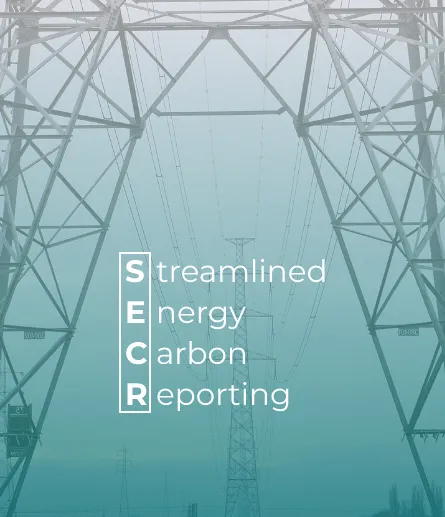SECR and ESOS
BECOME CARBON NEUTRAL
BECOME CARBON NEUTRAL
SECR
SECR stands for Streamlined Energy and Carbon Reporting. It’s a regulatory framework introduced by the UK government to enhance and streamline energy and carbon reporting requirements for certain organizations. SECR mandates that large UK-incorporated companies and Limited Liability Partnerships (LLPs) disclose their energy use, greenhouse gas emissions, and related information in their annual directors’ report.
SECR aims to encourage organizations to become more energy-efficient and reduce their carbon emissions by increasing transparency and awareness of energy consumption and environmental impact.
The reporting requirements under SECR apply to:
Quoted Companies: These are companies whose equity share capital is officially listed on the London Stock Exchange, the New York Stock Exchange, or NASDAQ.
Large Unquoted Companies and Large LLPs: These are organizations that meet at least two of the following criteria:
Annual turnover exceeding £36 million
Balance sheet total exceeding £18 million
More than 250 employees
Under SECR, qualifying organizations must disclose:
• Annual greenhouse gas emissions (Scope 1 and Scope 2 emissions).
• At least one intensity ratio, such as emissions per unit of revenue or per employee.
• Information on energy consumption, including electricity, gas, and transport fuel usage.
• Energy efficiency actions taken during the reporting period.
SECR reporting typically aligns with the organization’s financial reporting cycle, and the information disclosed must be verified by a director and approved by the board before submission. The goal of SECR is to drive greater awareness of energy usage and carbon emissions among large UK organizations and encourage them to take action to reduce their environmental impact.




SERVICES
ESOS
ESOS stands for the Energy Savings Opportunity Scheme. It’s a mandatory energy assessment and energy saving identification scheme in the UK, which requires large undertakings and their corporate groups to identify energy reduction opportunities in their organization every four years.
Here’s a breakdown of ESOS:
Who it Applies to: ESOS applies to large undertakings, which are typically organizations with 250 or more employees, or an annual turnover exceeding €50 million (£44,845,000 as of April 2022) and an annual balance sheet total exceeding €43 million (£38,567,000 as of April 2022). It also applies to corporate groups where at least one member of the UK group meets the criteria above.
Compliance Requirements: The main requirement of ESOS is to conduct energy audits or assessments covering total energy consumption and identifying cost-effective energy efficiency recommendations. This can include assessments of buildings, industrial processes, and transport.
Reporting: Organizations subject to ESOS must notify the Environment Agency (or equivalent body in Wales, Scotland, or Northern Ireland) of compliance by a set deadline, typically every four years. The notification includes details of the organization, the ESOS Lead Assessor, and confirmation that the organization has undertaken compliant energy audits or assessments.
Benefits and Enforcement: ESOS aims to help organizations identify opportunities to save energy, reduce costs, and improve energy efficiency. Non-compliance can result in financial penalties, and organizations are required to keep records of compliance for at least two compliance periods.
ESOS is part of the UK government’s efforts to implement the EU Energy Efficiency Directive and aims to drive energy efficiency improvements in large organizations, thereby contributing to the UK’s overall energy and carbon reduction targets.
